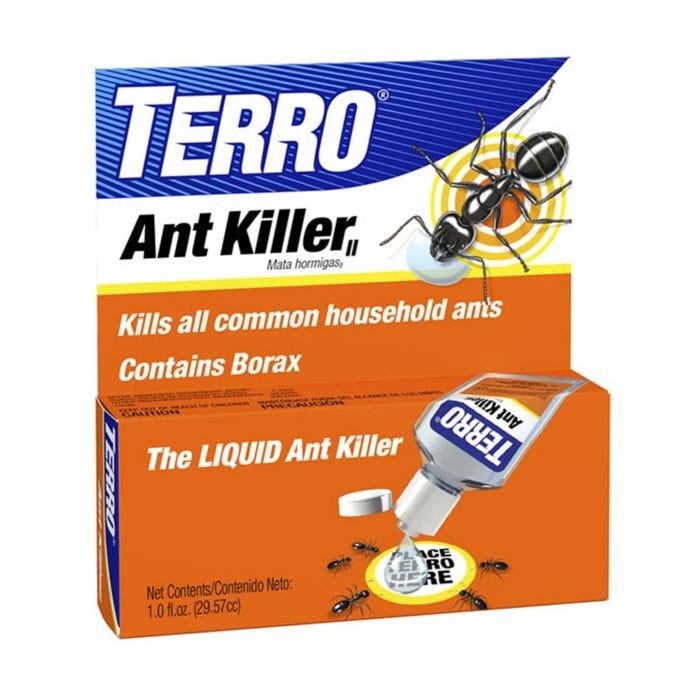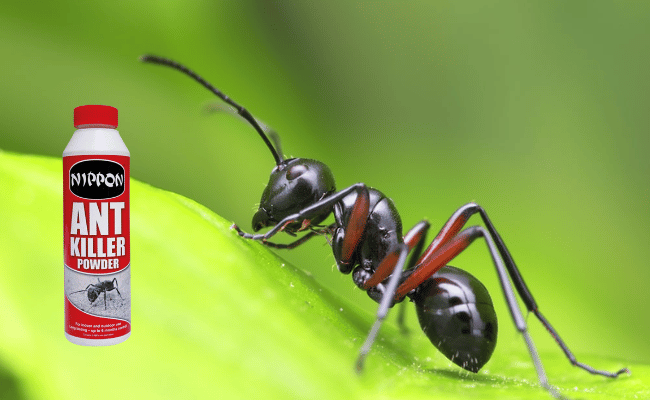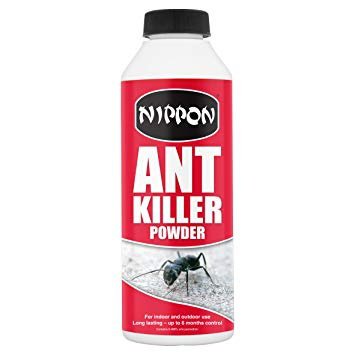Ant powder can be lethal to humans if ingested in significant amounts. It contains toxins that can harm the human body.
Ant powders are insecticides designed to target and eliminate ant colonies in homes and gardens. These products often contain active ingredients like borax, diatomaceous earth, or chemical insecticides, all of which are formulated to be toxic to insects. While the quantities used in ant powder are usually safe for humans when handled correctly, improper use or accidental ingestion, particularly by children or pets, can lead to serious health risks.
Symptoms of poisoning from ant powder may include headache, dizziness, stomach pain, vomiting, and in severe cases, respiratory failure or death. Consumers are advised to follow the product’s instructions carefully and keep it out of reach of children and animals. Remember, the key to safety with ant powder is responsible usage and storage.

Credit: www.poison.org
The Toxicity Of Ant Powder To Humans
Ant powder is a popular insecticide aimed at controlling ants. Homeowners often use it to protect their spaces from ant invasions. But, it’s essential to understand the potential risks associated with ant powder to human health. This section delves into the toxicity of ant powder and how it can affect humans.
Active Ingredients In Ant Powder
Ant powders include various chemicals that are toxic to ants. These active ingredients disrupt the nervous system of insects, leading to their death. Common active ingredients include:
- Borax (boric acid) – a less toxic option commonly found in baits.
- Hydramethylnon – interferes with energy production in ants.
- Fipronil – targets the central nervous system of insects.
- Permethrin – a synthetic chemical that affects insect nerve cells.
- Pyrethroids – synthetic versions of naturally occurring defense chemicals in chrysanthemums.
Human Exposure And Risks
Human exposure to ant powder can occur through inhalation, ingestion, or skin contact. Direct contact can lead to health issues such as:
- Eye irritation
- Skin rashes
- Respiratory problems
- Headaches
- Nausea
Children and pets are especially vulnerable to accidental ingestion of ant powder. Extreme caution is necessary when using these products in accessible areas. Signs of toxicity vary based on the ingredient and level of exposure. In severe cases, ant powder can be harmful or even fatal to humans, emphasizing the need for proper use and storage.
For safer application:
- Read labels carefully before use.
- Apply in areas out of reach of children and pets.
- Follow instructions for use and disposal.
- Avoid applying near food surfaces.
- Use protective gear when necessary.
- Seek medical help if symptoms arise.
Understanding Acute Vs. Chronic Poisoning
Grasping the distinction between acute and chronic poisoning is crucial. It’s all about the amount and duration. Think of acute poisoning as a sudden wave that hits hard but once. Chronic poisoning, on the other hand, is like a slow drip of water wearing down a stone over a long time.
Short-term Effects Of Ingestion
The immediate effects of ingesting substances meant to kill ants can be severe. Symptoms range from nausea and dizziness to much worse. Even a small amount can cause big problems.
- Vomiting
- Breathing trouble
- Muscle weakness
Fast action is key. If someone ingests ant powder by accident, get medical help right away. Every second counts.
Long-term Consequences Of Exposure
Repeated, small doses of toxins build up over time, leading to chronic poisoning. This isn’t about one big dose, but lots of little ones.
| Symptom | Consequence |
|---|---|
| Constant tiredness | Energy levels dive |
| Frequent headaches | Performance drops |
| Mood changes | Relationships suffer |
Over time, the body may fail to cope, leading to serious health issues. Regular check-ups can catch problems early.
Case Studies And Medical Reports
Exploring the dangers of ant powder reveals surprising case studies and medical reports. While rare, important lessons emerge from these incidents. Let’s dive in and understand the implications and medical community’s response to ant powder poisoning.
Incidents Of Ant Powder Poisoning
Adverse effects of ant powder often go underreported. Case studies show varied severity in poisoning, largely due to the type and quantity of ant powder involved. Records outline episodes where individuals, often children, accidentally ingested ant powder.
- Accidental ingestion can cause:
- Nausea
- Vomiting
- Diarrhea
- Inhaling ant powder:
- Difficulty breathing
- Chest pain
- Direct contact with skin leads to:
- Irritation
- Rashes
While fatalities are extremely rare, documented cases require attention to prevent future risks. Poison control centers maintain records of these incidents to educate on the potential hazards of misuse.
Clinical Treatment After Exposure
Immediate medical attention is crucial for individuals who have been exposed to ant powder.
| Type of Exposure | Immediate Actions | Follow-up Care |
|---|---|---|
| Ingestion | Do not induce vomiting. Rinse mouth. | Gastrointestinal decontamination if needed. |
| Inhalation | Move to fresh air. Administer oxygen if breathing is difficult. | Monitor respiratory function. |
| Skin contact | Rinse with water for at least 15 minutes. Remove contaminated clothing. | Treat for dermatitis if necessary. |
Healthcare professionals may use antidotes or activated charcoal, depending on the active ingredient in the ant powder.
Monitoring and supportive care remain pivotal. Records suggest most patients recover with appropriate and timely treatment.
How Ant Powder Works On Insects
How Ant Powder Works on Insects probes the science behind the tiny granules that wage war on ant colonies. Understanding this can shed light on how such small amounts of powder can have a significant impact on these persistent pests. Dive into the specifics beneath the surface, where the seemingly simple dust proves to be a complex weapon against ants.
Mode Of Action Against Ants
Ant powders work by targeting the insects’ vital processes. These powders contain insecticidal substances that, upon contact, disrupt the normal functions within the ant’s body.
- Disorienting the nervous system, leading to paralysis and eventually, ant death.
- Some powders act as desiccants, absorbing essential moisture from the ants’ bodies.
- Others interfere with the ants’ ability to digest food, starving them to death naturally.
Why Ants Are More Susceptible
Ant powder is particularly effective on ants for several reasons:
| Reason | Explanation |
|---|---|
| Body Structure | Ants have an exoskeleton that is easily covered in powder, making contact inevitable. |
| Social Behavior | The powder spreads rapidly due to close quarters and sharing of food. |
| Size | A small dose is potent due to their tiny bodies. |
Safety Measures And Proper Use
Ant powder is a potent pest control substance. Its main goal is to eliminate ants. Even so, it can be harmful to humans if not used correctly. Knowing how to handle and apply ant powder safely is crucial. This section will guide you on safe practices to prevent any risks to your health.
Label Instructions And Warnings
Always read the label before using ant powder. Manufacturers provide important guidelines on the packaging. These include how to use the product, the correct dosage, and safety warnings. For example, some ant powders require the use of protective gear like gloves or masks. Adhering to these steps will help ensure your safety.
Preventive Steps To Avoid Accidental Poisoning
- Keep ant powder out of reach of children and pets.
- Store ant powder in its original container to avoid confusion.
- Use only in well-ventilated areas to prevent inhalation.
- Wash hands thoroughly after handling ant powder.
By taking these preventive steps, you reduce the risk of accidental poisoning.
Legal Regulations And Restrictions
When it comes to pest control, safety is top priority. Can ant powder have harmful effects on humans? This question brings light to the importance of regulations and restrictions. Governments worldwide enforce policies. These policies protect both the environment and public health.
Government Policies on PesticidesGovernment Policies On Pesticides
Government policies serve as a shield against potential risks. They ensure that all pesticide products, including ant powder, pass stringent tests. It’s not just a quick check. Every safety box must be ticked before these products reach the shelves.
- Usage Guidelines: Detailed instructions on safe handling
- Labeling Standards: Clear, readable labels to inform users
- Restriction Zones: Areas where use is prohibited or controlled
Epa Standards And Compliance
The Environmental Protection Agency (EPA) plays a vital role. They set the standards for pesticide use. The EPA’s guidelines ensure that ant powder, when used correctly, poses minimal risk to humans.
| Standard | Description |
|---|---|
| Risk Assessment | Evaluates the potential health effects of exposure |
| Approval Process | Thorough review before the product is approved for use |
| Monitoring and Enforcement | Regular checks to ensure compliance with safety standards |
Compliance is not optional. Manufacturers must adhere strictly. Failure can lead to severe penalties. The goal is zero harm to human health.
Alternatives To Ant Powder For Pest Control
Exploring Alternatives to Ant Powder for Pest Control
While ant powder can deter unwelcome insects, safety concerns may arise. Natural and safer methods exist to keep ants away. These alternatives maintain a pest-free environment without the harsh effects of traditional ant powders. Let’s delve into effective, less risky options.
Natural And Safer Remedies
Bearing the well-being of families and pets in mind, natural remedies provide effective ant control. Below are some safe, eco-friendly solutions:
- Vinegar and Water Solution: A mixture of equal parts can deter ants.
- Diatomaceous Earth: This natural powder causes dehydration in ants upon contact.
- Citrus Peels: Grinding and spreading these around the house repels ants.
- Cinnamon Sticks and Cloves: Their strong scents keep ants at bay.
Integrated Pest Management Strategies
Integrated Pest Management (IPM) considers the environment and uses comprehensive information on the life cycles of pests to manage them. IPM employs the following steps:
- Identify and Monitor: Knowing the type of ant is crucial.
- Prevent: Sealing entry points stops ants from coming in.
- Mechanical Controls: Use sticky barriers or ant baits with less toxic substances.
- Chemical Controls: Apply as a last resort, focusing on less hazardous options.

Credit: www.terro.com
What To Do In Case Of Ant Powder Poisoning
Navigating the risks associated with ant powder requires knowledge and prompt action. Exposure to ant powder can be perilous. It’s crucial to understand immediate steps to minimize harm.
First Aid Measures
Immediate action can prevent severe consequences. Follow these steps if you suspect ant powder poisoning:
- Avoid panic: Stay calm to think clearly.
- Do not induce vomiting: This may worsen the situation.
- Lean victim forward: This prevents inhalation of ant powder.
- Clean the exposed area: If skin contact occurs, wash the area thoroughly.
- Use gloves: To avoid secondary contamination.
- Remove contaminated clothing: Do so carefully to prevent powder from spreading.
- Seek fresh air: Move the victim to a well-ventilated area.
- Follow product instructions: Check the ant powder packaging for emergency advice.
When To Seek Medical Help
Recognize these critical signs that require professional assistance:
| Symptoms | Action |
|---|---|
| Difficulty breathing | Call emergency services immediately. |
| Persistent cough | Seek urgent medical attention. |
| Severe skin irritation | Consult a healthcare provider. |
| Vomiting or nausea | Get to a hospital. |
| Changes in consciousness | Professional medical evaluation is a must. |
| Seizures | Emergency services are critical here. |
If symptoms are mild but persistent, contact Poison Control or a doctor. Keep the ant powder container for reference. Timely medical help can make a significant difference.
Raising Public Awareness For Prevention
Ant powder, a common pesticide, poses risks if mishandled. The question “Can ant powder kill humans?” sparks concern. While not typically lethal, misuse can lead to serious health issues. Hence, raising public awareness for prevention is crucial.
Educational Campaigns On Pesticide Safety
Educational campaigns are vital. They inform about the safe use of ant powder. Workshops and online guides provide the public with knowledge on how to handle pesticides properly.
- Proper storage to prevent accidental ingestion
- Usage guidelines to minimize exposure
- First aid steps in case of accidental contact
Community Support And Resources
Local communities play a key role. They offer support and resources for pesticide safety. Let’s explore various supports available:
| Resource | Description | Access |
|---|---|---|
| Hotlines | Poison control support | 24/7 availability |
| Workshops | Hands-on safety training | Local community centers |
| Online Portals | Guides and best practices | Accessible anytime |
With these resources, individuals learn proper ant powder application and safety. Remember, prevention starts with awareness.

Credit: directmarts.co.uk
Frequently Asked Questions For Can Ant Powder Kill Humans
Is Ant Powder Toxic To Humans?
Ant powder can be toxic if ingested or inhaled in significant quantities. It contains chemicals designed to kill insects, and while the toxicity is lower for humans, it is essential to handle it with care and follow the product’s safety instructions.
Can You Get Sick From Ant Powder?
Yes, exposure to ant powder can potentially make you sick. Symptoms of poisoning may include headaches, dizziness, nausea, or even more severe reactions in extreme cases. Always use it as directed and avoid breathing it in or ingesting it.
What Are The Risks Of Using Ant Powder?
The risks of using ant powder include respiratory problems if inhaled, skin irritation upon contact, and potential poisoning if swallowed. It’s vital to use protective gear and keep the powder away from children and pets.
How Much Ant Powder Is Harmful To Humans?
The level of harm depends on the ant powder’s concentration and the individual’s exposure duration. A small accidental ingestion might not be fatal but can cause discomfort. Always seek medical advice immediately if you suspect poisoning.
Conclusion
Ant powders are formulated to target pests, not people. Yet, misuse or extreme exposure poses risks. Always follow safety instructions. Remember, responsible application and storage are key. Seek immediate medical help if accidental ingestion or adverse effects occur. Protecting health is paramount when dealing with any pesticide.

I’m MD Tanvir, and I bring years of expertise gained from working closely with pest control companies to the forefront. My journey in the industry has inspired me to launch Bug Battler, a platform aimed at equipping people with the know-how to combat pests autonomously. Through Bug Battler, I aim to empower individuals with practical insights to tackle pest infestations effectively.

